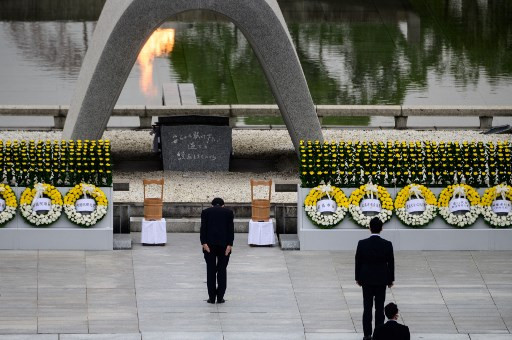Popular Reads
Top Results
Can't find what you're looking for?
View all search resultsPopular Reads
Top Results
Can't find what you're looking for?
View all search resultsActivists urge govt to ratify nuclear treaty
Change text size
Gift Premium Articles
to Anyone
I
ndonesia should ratify a landmark United Nations treaty to consolidate its commitment to put an end to the use of nuclear weapons, a campaigner for a Nobel Prize-winning global cause has demanded, as the world commemorated 75 years since the bombings of Hiroshima and Nagasaki.
The world saw its last nuclear attack in Japan in 1945, when the United States dropped two atomic bombs on the two cities on Aug. 6 and 9, respectively, killing thousands of people in the span of three days.
Despite having such a hard pill to swallow, a contemporary movement to rid the world of such weapons of mass destruction still lacks support from many countries, including Indonesia.
Jakarta has yet to ratify the UN Treaty on the Prohibition of Nuclear Weapons (TPNW) even after signing it three years ago, a fact that is not lost on Muhadi Sugiono, a campaigner for the International Campaign to Abolish Nuclear Weapons (ICAN).
“Indonesia has always pushed for nuclear disarmament, but when there is an [option] to take concrete steps, the decision doesn’t come as quickly as its commitment,” the Gadjah Mada University lecturer told The Jakarta Post on Thursday.
Muhadi suggested that Indonesia’s position as a nonpermanent member of the UN Security Council (UNSC) may have held back the country from ratifying the treaty or being more vocal in its stance on nuclear weapons, for fear that it would be denied support from other countries on the council. The five permanent members of the UNSC – the US, China, France, the United Kingdom and Russia – are all nuclear weapons-wielding countries.
But Muhadi insisted that ratification by Indonesia would help the cause move forward, as the treaty requires 50 signatories to bring it into force. Only 40 countries have so far ratified the agreement, even though 82 nations have signed the agreement.
Indonesia began earlier this month its presidency of the UN Security Council, the highest decision-making body of the UN, which is tasked with maintaining global peace and security and has the power to impose sanctions on all countries.
Muhadi explained that the TPNW could be a vital tool to prevent another nuclear fallout, which not only kills but spreads deadly radiation and can conjure a nuclear winter – a period of abnormal temperature drops caused by a layer of smoke and dust in the atmosphere blocking the sun’s rays.
“As long as nuclear weapons exist, there is no such thing as peace. We are still living under the shadow of nuclear weapons,” he said.
Echoing a similar message, UN Secretary-General António Guterres warned on Thursday that "the only way to totally eliminate nuclear risk is to totally eliminate nuclear weapons", as quoted by AFP in a video message commemorating the 75th anniversary of the Hiroshima bombing.
The UN first voiced its rejection of nuclear weapons in 1946 when it called for the elimination of atomic weapons. The move was followed by the Nonproliferation Treaty in 1968, which requires non-nuclear-weapon states to agree to never acquire nuclear weapons while nuclear-weapon states make a legal undertaking to disarm.
Decades later, the UN adopted the TPNW, which prohibits nations from developing, testing, producing, acquiring, possessing, stockpiling, using or threatening to use nuclear weapons.
The Indonesian Foreign Ministry’s director for international security and disarmament, Grata Endah Werdaningtyas, told the Post that the government had done some stocktaking and was coordinating ministries and agencies to gauge discourse on the ratification of the treaty.
“In general, there is positive support from various stakeholders at the national level, so that Indonesia can ratify the TPNW,” she said. “The Indonesian government will continue to commit to pushing for the Indonesian ratification process for the TPNW.”
Indonesia’s disarmament diplomacy has seen it join 16 other countries under the Stockholm Initiative that aims for nuclear disarmament. It has also held leading roles in past high-level conferences on nuclear weapons.
However, other government officials may not necessarily hold the same conviction.
In February, Coordinating Maritime Affairs and Investment Minister Luhut Pandjaitan raised eyebrows when he said on the margins of the World Economic Forum in Switzerland that he was considering the possibility of a nuclear-powered Indonesia. It was unclear whether he was referring to nuclear arms or nuclear energy for electrification.
“As a [former military] general, I also thought about Indonesia having nuclear power, but the President is still busy thinking of prosperity,” Luhut said at the time, referring to a conversation with an American general who was seemingly looking down on Indonesia. “I thought in my mind, maybe only if we had nuclear power it would scare you.”










